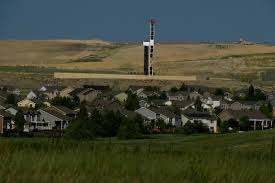
A Colorado judge has dealt a setback to residents of Longmont who are fighting to revive a fracking ban.
The community group named Our Longmont attempted to re-examine the legality of municipal fracking bans after the Colorado legislature passed Senate Bill 181 which gave local governments the power to regulate the impacts of fracking. But Boulder County District Court Judge Nancy Salomone closed the case according to the Longmont Times-Call.
Salomone’s ruling stated “the purported change in statutory law is not an extraordinary circumstance that warrants reopening this case,” adding the court further holds it erred in granting Our Longmont’s motion to reopen the case. She further stated “there is no dispute that Our Longmont may have the merits of its claim resolved by filing a new action for declaratory judgment in a district court having jurisdiction over the matter.”
Joseph Salazar, executive director of Colorado Rising and the attorney representing Our Longmont, said the anti-fracking advocacy groups will convene in the coming weeks to determine how to proceed.
“This matter isn’t over with,” he said. “These facts aren’t going to be disputed. How can they be? The statute is what it is. I still need to get with the other respondents and talk about how to move forward, but I expect we’ll do so pretty rapidly.”
Since Gov. Jared Polis signed Senate Bill 181 into law on April 16, Our Longmont contends that ruling is no longer applicable.
The Colorado Oil and Gas Association insists that allowing local governments to institute a fracking ban was not the intention of Senate Bill 181.
“It’s important to remember that banning responsible energy development in Colorado is illegal,” said Dan Haley, president and CEO of the Colorado Oil and Gas Association. “The sponsors of SB 181 and Gov. Jared Polis also have repeatedly said this new law does not allow for a ban on oil and gas development. It’s time to get beyond these litigation stunts from keep-it-in-the ground activists and to move our state forward on a rational path that protects Colorado’s environment, protects communities, and protects the hard-working men and women who produce the energy we all rely on each day.”
While the Colorado Oil and Gas Conservation Commission is working to implement “the most sweeping oil and gas reforms the state has ever seen,” according to Senate Majority Leader Steve Fenberg, the process has been slow.
In the nine months since Senate Bill 181 was approved, the Colorado Oil and Gas Conservation Commission has only approved new flow line rules, instituting requirements for testing and ensuring the integrity of flow lines and making sure out-of-use lines are shut down properly.
The rules also are aimed at carrying out the goal of providing people more information about the location of the oil and gas lines they live, work and drive over by creating a comprehensive map for the estimated 17,300 miles of flow lines throughout the state.
Additional regulations regarding permitting, leak detection, alternative siting and public health, safety, and welfare will not be considered until 2020.
While Colorado Rising has generally supported this process, it contends Senate Bill 181 should allow for municipal fracking bans since it was not explicitly prohibited in the language of the bill.
“If the Legislature intended to prohibit local governments from banning oil and gas operations within their jurisdictions, it would have clearly said so,” Salazar said. “Courts will not interpret a statute to mean that which it does not express.”
Source: Longmont Times-Call





